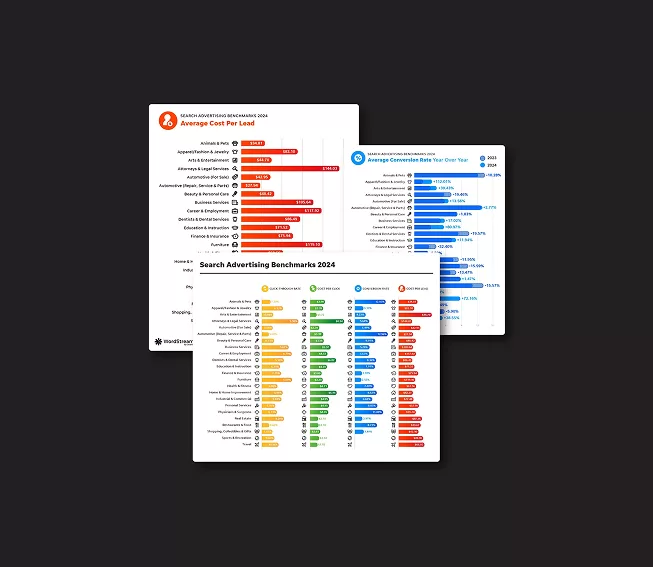When it comes to your digital marketing strategy, both content marketing and social media marketing should take center stage. Each offers distinct ways to engage your audiences and boost your brand presence.

But I’ve seen some companies treat both the same. Sure, there are blurred lines between the two. But if you want to get the most traffic, engagement, and customers out of each, you’ll need to know the differences between content marketing vs. social media marketing.
This article explains the key differences and gives expert insights so you can leverage the best of both content and social media for your business.
What is content marketing?
A content marketing strategy entails creating and sharing content that’s valuable and relevant to your target audiences. It helps you attract and acquire a clearly defined audience—and, ultimately, drive conversions. In fact, a recent HubSpot study showed that brands that blogged got 55% more website visitors.

Creating quality content is also helpful for SEO—so your business can show up on Google when people search for relevant terms. The better and more keyword-rich your content is, the higher you’ll rank on the search engine results pages (SERPs).
Content marketing tactics include publishing blog posts, creating videos, or writing case studies. The content often lives on your website as a way to generate traffic. But it can also be published on third-party websites or even on your Google Business Profile like this example from a plumbing company.

Aside from acquisition, business owners also use content marketing to nurture and retain existing customers through help center and knowledge base content (get more content marketing examples you can copy here).
What is social media marketing?
Social media marketing is similar to content marketing in that you’re creating content. But in social media marketing, you’re looking to generate audience awareness and engagement through social channels like Facebook, Instagram, and TikTok.
Social media marketing strategy helps you promote your brand, engage your audiences in a more informal setting, and build relationships.
Social media marketing strategies include posting educational or entertaining content, sharing special offers, or promoting products through social channels.

Advantages of social media marketing include community engagement and brand awareness, immediate reach and visibility, enhanced audience targeting, and viral potential and shareability.
Social media marketing is sometimes confused with social selling, which is more of a one-to-one conversation salespeople have with customers on social media platforms.
Key differences between content marketing vs. social media marketing
Let’s unpack a few things that separate content marketing and social media marketing strategies.
1. Focus and purpose
Content marketing primarily focuses on consistently creating and distributing valuable, relevant content to attract, convert, and retain your target audience. This strategy also plays a big role in educating your audience and capturing demand for your product or service.
On the other hand, the main purpose of social media marketing is to enhance relationships with customers, prospects, influencers, and partners through two-way dialogues that generate interest in your company. This channel is also powerful in creating demand for your business.
2. Timeframe for results
Content marketing is more suitable for long-term strategy; it certainly requires patience and consistent effort before seeing significant results. Content focuses on building trust, authority, and brand loyalty, which typically takes time to establish.
On the other hand, social media marketing often gives quicker results through tracking immediate engagement and direct interactions with the audience. Since social media allows real-time engagement, this can lead to faster actions like likes, shares, and comments.
For example, Oreo, the cookie brand, made headlines during the 2013 Super Bowl with its real-time marketing on Twitter. When a power outage occurred during the game, Oreo quickly responded with a tweet saying, “Power out? No problem. You can still dunk in the dark.”

This witty and timely tweet went viral, helping Oreo gain a massive boost in its brand visibility and social media presence. (I remember seeing this happen in real-time!)
3. Content types and formats
Content marketing is more about creating informative, in-depth content to address your audience’s pain points and provide solutions, while social media marketing focuses on concise, visually appealing, easily shareable content.
Marketers typically use these formats for content marketing:
- Blog posts and articles
- Ebooks and whitepapers
- Infographics and data visualizations
- Case studies and success stories
- Podcasts and webinars
- Video tutorials and explainer videos
Take The Farmer’s Dog, for example.
The healthy pet food service posts long-form articles to their blog to educate their audience of dog owners and veterinarians.

Alternatively, here are content types marketers use for social media marketing:
- Short and catchy captions
- Visual content, such as images and graphics
- Short videos and video clips
- Polls and interactive content
- Memes and GIFs
In contrast to The Farmer’s Dog’s content marketing, let’s examine Dove’s social media marketing campaign on Instagram with the hashtag #RealBeauty.

They shared images and short videos featuring real women of diverse body types and ethnicities, promoting body positivity and self-acceptance. These posts resonated with their audience and encouraged them to share their own stories, leading to a viral movement.
4. Cost considerations
The cost of content marketing can depend on different factors, including the type of content you create, the length of your content, and the number of channels you distribute your content on.
According to a HubSpot study, the average cost of creating a blog post can be anywhere between $150-$3,000. This cost can vary depending on the length and complexity of your blog posts.
The cost of distributing your content can also vary depending on the channels you use. If you distribute content via social media, you can organically share your posts on your profiles, or you can pay to boost or sponsor your posts.
The cost of social media marketing can also vary depending on a number of factors, including the number of social media platforms you use and the type of social media advertising you run.
Do you remember the viral social media marketing campaign on YouTube called “Will It Blend?”
Blendtec, a blender manufacturer, launched a series featuring the founder himself demonstrating videos of blending various items, from iPhones to golf balls, to demonstrate the power of their blenders.

The relatively low production cost of these fun and engaging videos, combined with the massive reach of YouTube’s audience, resulted in significant brand exposure and increased sales.
All in all, both content marketing and social media marketing are relatively cost-effective marketing strategies.
Content marketing vs. social media marketing: When to use each
The choice between content marketing and social media marketing should take into consideration:
- Your business goals
- Your target audience
- What resources you have available
- Your overall marketing strategy and what other channels you’re investing in
Both approaches have their fair share of advantages and downsides. Let’s see which one you should use and why.
Understanding your marketing objectives
When you’re positioning your brand as an industry leader and providing in-depth, actionable insights into a topic or product, content marketing is the way to go.
On the other hand, when your primary objective is to quickly garner outreach, gain brand visibility, and create viral content, creating social media content is a more attractive option.
According to Coty Perry, the Chief Marketing Officer at Anglers.com,
“The higher the level of trust needed, the more content marketing matters. Think of how omnipresent healthcare companies and banks are in their marketing, from billboards and TV ads to how-to guides and direct mail. There really isn’t a marketing channel these companies don’t leverage, and that’s a direct choice.
Social media marketing is more useful when trying to make a faster connection. It’s also for scrappier companies since social media is often the cheapest marketing strategy (not to say it can’t get pricey!) Fashion is a great example–you don’t care about the retailer’s long-standing reputation. You just want the fashionable top, and you want it now.”

Identifying your target audience and their preferences
Many industries and businesses benefit from both approaches, but one can be more of a priority based on your industry and its target audience.
For example, Carrie Boswell, a Digital Marketing Content Specialist at PLANOLY, shares that industries like healthcare, repairs, automotive, legal, and restaurants rely heavily on content marketing. Whether users seek medical advice, information on services and offerings, the closest restaurant or salon, etc., they’ll be looking for the most digestible and relevant information based on their search to help them make the right decision.
Social media marketing is great for industries like lifestyle, real estate, fashion and beauty, and entertainment that thrive by showcasing products or services and offering solutions to customer problems. It results in customer leads and brand relevance.
The best approach will also depend on how well-established you are in your industry.
According to Katherine Claire Atienza, a Senior Content Strategist at ExaWeb Corporation, “Startup businesses can benefit most from social media marketing since it’s easier to establish and introduce your brand, products, and services to potential customers using social media platforms. Facebook, Instagram, and Twitter are also used more by people nowadays, so you have higher chances of raising your brand awareness and engagement.”
Meanwhile, if your business is already established and you want a platform your audience can visit for more information and other transactions, you will benefit more from content marketing.
Consider long-term vs. short term-results
If long-term, sustainable growth is your goal, look no further than content marketing.
Unlike paid advertising or social media posts with a short lifespan, actionable and evergreen content can continue to bring you audiences for years to come. This also translates into a more substantial ROI over time.
Look at the soap brand Dr. Squatch as an example of how content marketing can establish your brand and build trust through education.

The brand infuses each post with its quirky voice but also answers important questions about sustainability and personal care. Over time, readers will become subscribers (scrub-scribers?) who’ll then become repeat customers.
Social media marketing works differently. A brand can get interactions from their audience on an Instagram or Facebook post a few minutes after posting it.
Leveraging both content marketing and social media marketing
Content marketing is a way of building customer loyalty, trust, and brand awareness by creating and sharing relevant, valuable content with your target audience. Social media marketing is a way of doing the same thing–only through social networks like Instagram, Facebook, Twitter, and LinkedIn.
And if you think about it, you can’t use one without the other.
For example, when implementing content marketing, brands still use social media as channels to distribute their content.
Notice how the pet food brand shares their long-form content on Instagram.

And when implementing social media marketing, they’re still creating content in the form of social media posts, videos, reels, Instagram stories, and the like.
So, it goes without saying that it’s best to leverage both in a coordinated strategy.
According to Sarah Jameson, Marketing Director at GreenBuildingElements,
“While content marketing focuses on owned channels, social media amplifies its reach. Social conversations also inform content creation. Together, they attract and retain audiences by establishing thought leadership and community. The key is integrating content and social strategies across the customer journey to accelerate awareness, consideration, and conversions.”
Nick Gaudio, Director of Content & Creative at Rattle, also believes that, ultimately, you need both social media and content marketing to make progress. He shares,
“If you write an amazing blog post and nobody can find it, it doesn’t get seen, and it’s all for naught; if you promote yourself on social media without developing the thought leadership/street cred through longer form, deeper, meatier content, you’ll have a vapid and tenuous relationship with your audience.”
Striking the perfect balance: Integrating content marketing and social media marketing
Content marketing focuses on creating valuable and informative content to build trust, authority, and long-term relationships with the audience. On the other hand, social media marketing emphasizes real-time engagement, immediate brand visibility, and fostering a vibrant online community.
Ultimately, both content marketing and social media marketing are essential for marketing success. Content marketing builds authority and trust through valuable content, while social media marketing will help you with immediate brand visibility and engagement.






